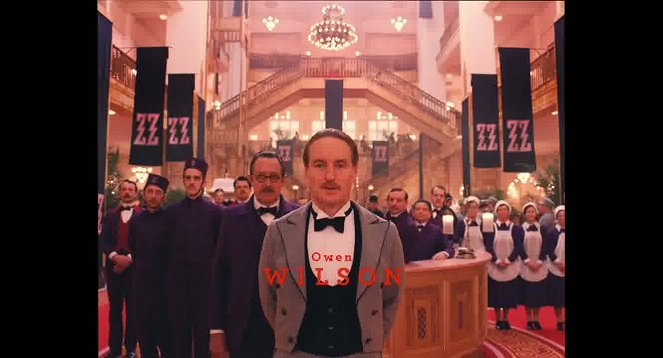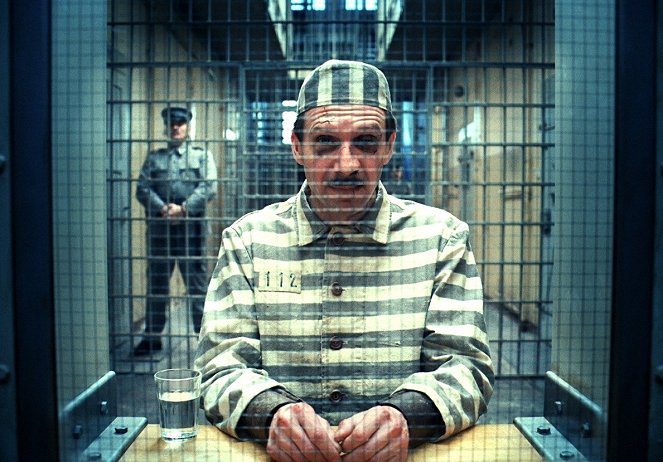Directed by:
Wes AndersonScreenplay:
Wes AndersonCinematography:
Robert D. YeomanComposer:
Alexandre DesplatCast:
Ralph Fiennes, F. Murray Abraham, Mathieu Amalric, Adrien Brody, Willem Dafoe, Jeff Goldblum, Harvey Keitel, Jude Law, Bill Murray, Edward Norton (more)VOD (4)
Plots(1)
The movie recounts the adventures of legendary concierge Gustave H. and Zero Moustafa, the lobby boy who becomes his most trusted friend. The story involves the theft of a priceless painting; a raging battle for an enormous family fortune; and a desperate chase on motorcycles, trains, sleds, and skis - all against the back-drop of a suddenly and dramatically changing Continent. (Warner Bros. UK)
(more)Videos (15)
Reviews (18)
This playful coloring book is highly original in Wes Anderson’s traditional fashion. The fast-paced narrative tells an engaging story about interesting characters, who shine due to the brilliant actors portraying cast. I’m glad the film succeeded commercially even in US cinemas, because its unique filmmaker deserves it.
()
Wes and his animated woods, this time in a cabaret version of The World of Yesterday: Memories of a European. The film is best described by the quote dedicated to the main character: "His world came to an end long before he entered it." Unlike Zero, however, I seriously doubt that Anderson handles this paradox with grace. Unfortunately, I am already able to guess ahead of time the points and camera movements, and the cameos of the stars. The story is less inventive than Murder in a Parlor Car Compartment, and it's hard to tell if an alibi with nickel-and-dime novels will stand up (these are full of twists, which The Grand Budapest Hotel is not in its linear caricature). As soon as the enthusiasm for the artistically beautifully grasped retro faded away (if we can call a style retro that is freely reminiscent of something old, but does not even correspond to it), I found myself in a sequence of dynamic and loosely connected gags that float in an approximate intellectual goulash of references, paraphrases and winking. Anderson is so fascinated by the veneer of his toy industry that, when you finally make it to the melancholic finale, you are almost sorry that he has devoted so much time to characters and scenery that are beautiful but totally flat. The Grand Budapest Hotel captures an artist at the height of narcissism, who misses what is really interesting under the influx of colorful props and grotesque gags. No doubt more fun than the desperately overrated Moonrise Kingdom, but otherwise similarly meaningless.
()
I had fun, I thought some of the scenes were brilliantly conceived. It had pacing and very fitting music. The acting was very good and Fiennes' pronunciation was simply pleasing to my ear. Although there is a bitter story beneath the veneer of comedy, I enjoyed it and left the cinema satisfied and amused all over again at some of the lines. The only thing that bothered me a little was the empty feeling at the end, but I guess it was meant to be. A weaker 4 stars, and I can definitely recommend it for viewing.
()
A lot of figures, no characters. A lot of narrators, no narrative. A lot of movement, no direction. Anderson again balances on the edge of a chasm of gratuitous horsing around in grand style. The design of the individual settings and periods (red and purple art deco in the 1920s, grey and pink during the Nazi era, orange and yellow in the 1960s), the geometric perfection in the mise-en-scene and the seemingly hand-crafted tricks make up an unbelievably entertaining blend of the poetics of classic slapstick and Méliès’s more spectacular films. (A detail for connoisseurs is the fact that each era was shot in a different aspect ratio: 1.85:1 for the present, 2.35:1 for the 1960s, academic format for the 1930s). However, I don’t agree that Anderson has matured and has given us a sad and melancholic film in colourful wrapping. Any attempts at seriousness fail, whether in relation to the characters or to the theme of war and times long past. The war context, the hint of nostalgia and the multiple rewritings of Central European history serve mainly as an excuse for colourful fooling around. Zweig is present more or less thanks only to the nesting-doll structure of the narrative, the infrequent consideration of which over the course of the film raises a question that I had to ask myself repeatedly, despite my desire to let myself be freely carried away by Anderson’s imagination – “What is this for?” According to the principle of “why do something the easy way when you can do it the hard way”, the film contains a full range of prototypical situations that we would find in their unaffected form, which would better serve the story, in classic escape and caper movies. The acknowledged inspiration taken from Hitchcock’s thrillers (a persecuted innocent) and Lubitsch’s screwball comedies from obscure European countries (particularly Ralph Fiennes’s character and his attitude toward women, but not the “cleverness” of the dialogue, whose humour rather often consists in a wager on a sure thing in the form of well-timed vulgarity) is purely superficial. The intentional contrivance of the situations finds a response only in the actions of the characters, who respect strict rules and walk in diagonal lines, thus elegantly closing the circle, as the contrived world gives meaning to its lifelessness through artificial figures. I admire the precision with which Anderson builds his worlds and I enjoy the flawless comic timing of all of the actors, but I simply cannot find any deeper meaning, greater depth or narrative imaginativeness in Grandhotel Budapest. 75%
()
In Anderson’s nostalgic and grotesque retro worlds, this one may be the most literal and gaudy, but at the same time it represents a (perhaps too) literal confession not only to its own protagonists, but to the filmmaker himself. “To be frank, I think his world had vanished long before he ever entered it. But, I will say, he certainly sustained the illusion with a marvelous grace.”
()



Ads